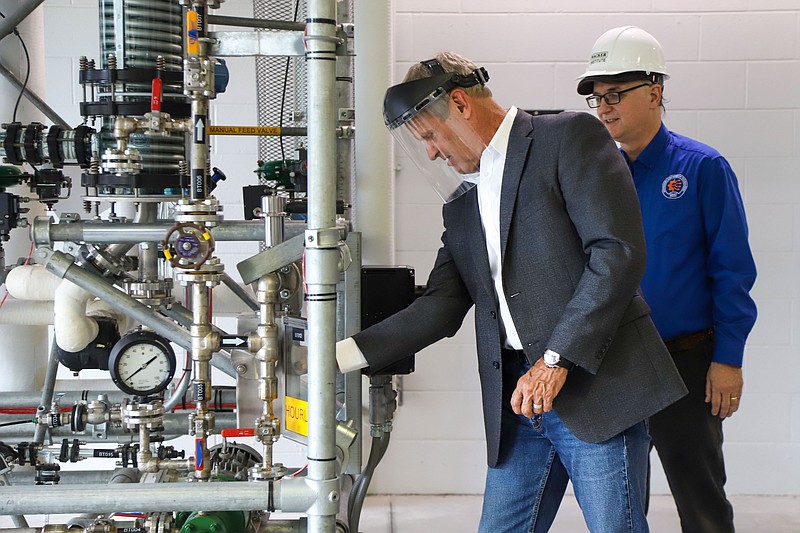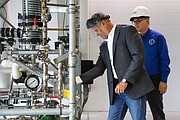Tennessee Gov. Bill Lee, a former licensed plumber and mechanical engineer, went back to school this week to see the advanced mechatronics, robotics, nondestructive testing and other skilled trades being taught to high school and college students at Chattanooga State Community College.
Lee praised the training for students and industry workers at the Wacker Institute and the other engineering and automotive training facilities he toured Wednesday at the campus along Amnicola Highway. He has pushed such vocational and trade schools since becoming governor in 2019.
"We're seeing how our investments in higher education are changing people's lives and meeting the skill and job needs of our state," Lee said during a tour of many of the newest facilities at Chattanooga State — one of three Tennessee community colleges he visited this week. "There is really relevant programming going on here at Chattanooga State. They are clearly adapting to what is needed in the workforce, and they are designing programming that is actually going to give people the skills they need to get the jobs they want."
With Tennessee's unemployment rate hovering near historic lows and more than twice as many job openings as there are unemployed Tennesseans, such training to fill key skilled jobs is also vital for the state's economic growth, Lee said.
"This training will not only improve your lives, it helps improve the lives of all Tennesseans," Lee told students during a tour in the Gerald McCormick vocational training center.
Dylan Drew, a senior at Central High School, is in the second year of chemical engineering training at Chattanooga State as part of the polytech program that offers skilled jobs training in high school for part of the school day.
"This gave me a free in to college, and I hope that I can soon become an intern at BASF," Drew said after meeting Lee. "I came here last year, and it was amazing what you can learn and the opportunity this provides."
Esther Villanueva, a student at East Ridge High School, said she didn't like traditional high school and was eager to learn a valuable job skill.
"I just didn't fit in a traditional high school environment, and I really wanted to go on and do more with my education," she said in an interview in the Chattanooga State classroom where she is studying chemical engineering technology. "I found that freedom here at Chattanooga State, and I found what I really want to do."
Other students in vocational programs at Chattanooga State are older adults already on the job and looking to upgrade their skills, which Lee said is also critical as the workforce and labor demands change. Anthony Carter, who has worked at McKee Foods in a variety of jobs since 2005, will soon gain his certification in mechatronics from Chattanooga State to become the first such certified mechatronics worker at the Collegedale bakery.
"It's a growing field, and I've been able to get this training while continuing to work at McKee," Carter said.
The college is tailoring many of its programs for emerging fields and specialized needs of local industry, Chattanooga State President Rebecca Ashford said. When Wacker Chemie built its $2.5 billion polysilicon plant in Charleston, Tennessee, in 2011, it also built the Wacker Institute on the Chattanooga State campus to help train workers for the new facility.
Bruce Coulter, an associate professor at the Wacker Institute, said the facility was patterned after similar vocational training programs in Germany, where he and many of the first Wacker employees were trained. During the past 12 years, hundreds of workers for Wacker and other chemical plants such as BASF and Olin Chemical have gained training and certification for their specialized jobs.
"Almost all of the operators at the Wacker plant have gone through this training here, which is fairly unique in our region," Coulter said.
Chattanooga State continues to expand its training facilities, including the recent installation of a large CT scanner in the nondestructive testing unit — one of the first such pieces of equipment at any two-year college in the country.
Work began this past year on a $21.9 million advanced manufacturing building for the Tennessee College of Applied Technology. The 49,127-square-foot, two-story structure now taking shape will boost student capacity at the growing program at Chattanooga State.
Aided by a $12.2 million grant from the state, Chattanooga State also plans to relocate and double the capacity of its truck driving training offered through the Tennessee College of Applied Technology for commercial driver licenses and develop another future-ready institute focused on logistics. When the diesel mechanics program is shifted to Soddy-Daisy, the electric vehicle engineering technology program and classrooms will be expanded, Ashford said.
Contact Dave Flessner at dflessner@timesfreepress.com or 423-757-6340.

